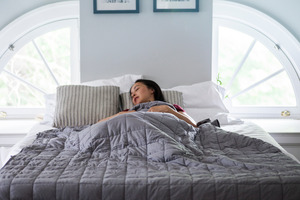Using Weighted Blankets for Sleep Apnea
September 6, 2024

If you’ve been looking for a way to improve the quality of your slumber, you may have considered a weighted blanket. Many people – especially those with anxiety – use them to enjoy more restful nights. But what if your lack of quality sleep is due to sleep apnea? Could a weighted blanket still help? Here’s what you need to know before making any lifestyle changes to address your sleep-disordered breathing.
What Exactly is Sleep Apnea?
Sleep apnea is a sleep disorder that is estimated to affect around 39 million adults in the United States. It can cause your breathing to repeatedly pause and restart while you’re asleep. The interruptions to your breathing can force you to wake up frequently, thus disrupting the sleep cycle and preventing you from getting quality slumber. Most of the time, sleep apnea is caused by an obstruction of the airway.
How Can Weighted Blankets Improve Sleep?
Weighted blankets put a light amount of pressure on your entire body while you sleep. This helps calm the nervous system, lowers your heart rate, and causes you to feel more relaxed.
On top of that, the pressure from the blanket can stimulate the production of oxytocin (known as the “feel-good hormone”) and serotonin. It also decreases levels of cortisol, which is involved with the body’s stress response. These changes in your hormone levels can go a long way toward improving the quality of your slumber.
How Can Weighted Blankets Help with Sleep Apnea?
So how can weighted blankets specifically benefit people with sleep apnea? Here are a number of potential ways they can help:
- Studies have shown that increasing oxytocin levels (which, as noted, is one of the effects of using a weighted blanket) can potentially lessen sleep apnea symptoms.
- Weighted blankets have been shown to help lower blood pressure. This is good news because sleep apnea and high blood pressure are often linked.
- Sleeping on your side instead of on your back can make sleep apnea symptoms less severe. Weighted blankets can stop you from moving around too much while you slumber, which can be helpful if you’re trying to make the transition to side-sleeping.
Is a Weighted Blanket Right for You?
It should be noted that weighted blankets by themselves are not recommended for sleep apnea patients, as the added weight can contribute to your breathing problems. However, if your sleep apnea is already being treated, a weighted blanket could help you get an even better night’s rest.
If you are currently using an oral appliance or a CPAP machine for sleep apnea, you should talk to your dentist or doctor before using a weighted blanket. They can help you figure out whether this particular sleep aid is a good choice for you.
About the Author
Dr. Laura Philipps went to Tufts University for her Doctor of Dental Medicine, and she holds membership with the American Academy for Oral Systemic Health, the Texas Dental Association, and other organizations. Her dental practice in Midland provides fully individualized care for all kinds of patients and offers oral appliances for treating sleep apnea. To schedule a consultation with Dr. Philipps, visit her website or call (432) 570-4433.
No Comments
No comments yet.
RSS feed for comments on this post.
Sorry, the comment form is closed at this time.
